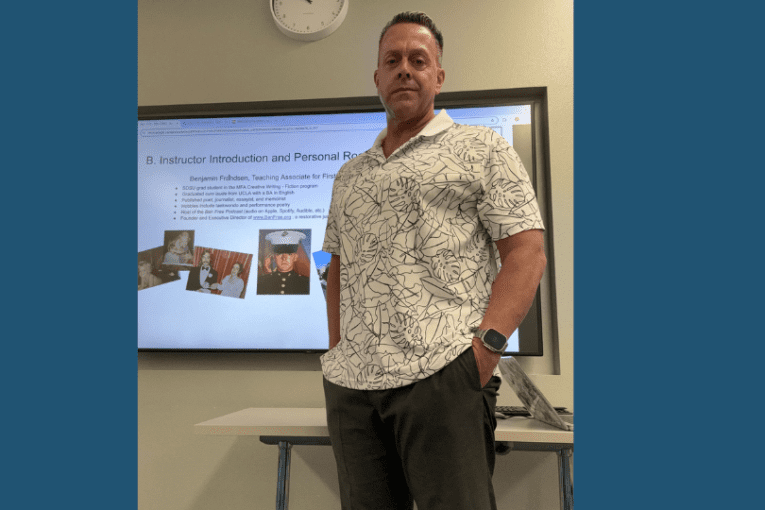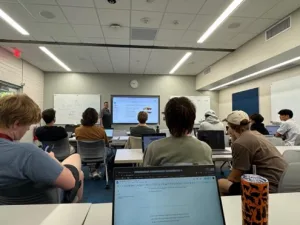
Featured image: photo courtesy of Benjamin Frandsen
Today he is in a taekwondo class, after which he will head to the gym before taking the stage at church to sing in the choir. There will be a military veteran disability therapy session, a check-in call with his dad and, before he crashes, a night run while listening through his earbuds to his MFA reading assignments in audio format. Martial arts, exercise, spirituality, family and literature—those ingredients have always been in Benjamin Frandsen’s recipe book. Now he is a university teacher.
He was a better student while here at Valley State Prison (VSP) than any of us are, and he earned more AA degrees than anybody who ever did time here. He became externally published as a confined writer in more places than anybody ever housed at VSP and turned his acumen for pushing the pen into a UCLA acceptance, where he was admitted and graduated with honors from the English department. He then received a full-ride to attend the MFA creative writing graduate program at California State University San Diego, which offered him a teaching associate job.

What is remarkable about Ben’s matriculation path is that both of California’s public university systems accepted him as a student and amplified his ascendency despite the stain of his criminal convictions. UCLA featured him multiple times in media, celebrating his justice-impacted status, and SDSU hired him to teach before earning his MFA. We have written extensively about how folks like Reginald Dwayne Betts, Randall Horton, Michelle Jones, and Angel Sanchez each contended with stiff-arm tactics deployed by academic institutions that sought to prevent their enfranchisement owing to their felonies. Ben has not had to contend with the sort of invisible hand obstruction that prevented filmmaker Adamu Chan from traveling to a film festival in New York while on parole.
Some might chalk Ben’s ascendency up to a lazy trope about white privilege without really knowing anything about where he comes from. He certainly would stand out in a lineup with those aforementioned already-returned citizens. Ibram X. Kendi taught us all about the baseless conception of race, and yet more than one Pulitzer Prize- and American Book Award-winning author has told us quietly that Ben’s surname, gender, or sexual orientation–not his copy–has more than once determined his ability to win a writing award, scholarship, or fellowship. Categorical imperatives can hip-check meritocracy when funders and gatekeepers decide who can compete at all.
You see, just as campaign ads and polls can silo a person’s societal value, so too can those traits become the pretext for how the carceral state projects power beyond the prison’s fence line and after the so-called freedom phase. There’s an invisible prison project slithering through restitution, probation, and parole that constricts possibility like a silk ascot that doubles as a convenient chokehold accessory in the wrong city during a tilted encounter with deadly uniformed power. Snares and traps exist by design—surplus labor becomes an expense—confined surplus labor becomes a labor force of servitude. They don’t want us free.

Thankfully, the world hasn’t tried too hard to box Ben in or out of opportunity. Achievement has been his best friend. It’s inspiring to visualize him standing before his freshmen students at SDSU after having stared at his back-row cellphone POV while sitting as a student in Professor Adam Bradley’s Hip Hop Poetics class at UCLA. It makes me wonder why we don’t see more examples of post-carceral success while still confined. Why are we not reading about Ben’s transformation in the San Quentin News or hearing him talk about the journey on the CDCR Unlocked podcast? It’s why we do what we do—why we write about it—because you’re witnessing a rare-air butterfly effect.
